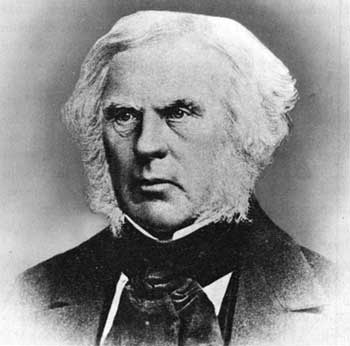|
WHITMAN MISSION National Historic Site |
 |
A Welcome at Fort Vancouver
The stern but kindly Dr. McLoughlin gave the missionaries a warm welcome. He appreciated the significance of the ladies' successful journey across the continent. While complimenting them on this, he must have thought to himself that they were but the vanguard of many American families to follow.

Dr. John McLoughlin, Chief Factor of the Hudson's Bay
Company in Oregon, exercised vast sway over an area extending from
British Columbia to western Montana. Physically a giant and of an
imperious nature, he was to the Indians "The White Eagle." On their
arrival at Fort Vancouver Narcissa wrote: "I feel I have come to a
father's house indeed, even in a strange land has the Lord raised up
friends."
OREGON HISTORICAL SOCIETY
To the surprise of the party, McLoughlin's stores contained most of the articles needed to establish the missions: household furniture, clothing, building supplies, books and provisions; all were for sale. Narcissa wrote home that it was not necessary to bring anything from the East, for everything could be found at Fort Vancouver, "the New York of the Pacific Ocean."
While the ladies enjoyed the hospitality of the fort, Whitman, Gray, and Spalding went back up the Columbia to select their mission sites. With their husbands away, the two women caught up on their correspondence, sewed clothing, and picked out the household utensils they would need. Narcissa spent her evenings singing to the children at the fort school. On November 3 Spalding returned to escort Narcissa and Eliza to their new homes in the interior.
If McLoughlin had been cool toward the missionaries, such behavior could have been justified. The influx of Americans that was bound to follow would inevitably change Oregon. British control would then be threatened and fur trade profits reduced. Nevertheless, McLoughlin, Pambrun, and other Hudson's Bay Company people extended a helping hand to the missionaries. Such success as the missions had in the Pacific Northwest was due, in good part, to the assistance they received from the company.

Fort Vancouver, sketched by Henry J. Warre in 1845.
WASHINGTON STATE HISTORICAL SOCIETY
|
|

|
|
Last Modified: Sat, Sep 28 2002 10:00:00 pm PDT |


